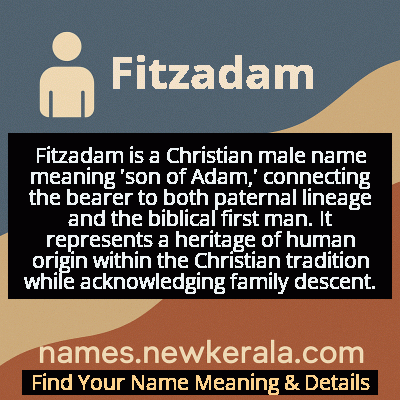Fitzadam Name Meaning & Details
Origin, Popularity, Numerology Analysis & Name Meaning of Fitzadam
Discover the origin, meaning, and cultural significance of the name FITZADAM. Delve into its historical roots and explore the lasting impact it has had on communities and traditions.
Name
Fitzadam
Gender
Male
Origin
Christian
Lucky Number
8
Meaning of the Name - Fitzadam
Fitzadam is a Christian male name meaning 'son of Adam,' connecting the bearer to both paternal lineage and the biblical first man. It represents a heritage of human origin within the Christian tradition while acknowledging family descent.
Fitzadam - Complete Numerology Analysis
Your Numerology Number
Based on Pythagorean Numerology System
Ruling Planet
Saturn
Positive Nature
Ambitious, efficient, realistic, and authoritative.
Negative Traits
Materialistic, stressed, confrontational, and can be overly ambitious.
Lucky Colours
Dark blue, black.
Lucky Days
Saturday.
Lucky Stones
Blue sapphire, amethyst.
Harmony Numbers
2, 4, 6.
Best Suited Professions
Business leaders, managers, financial services, law enforcement.
What People Like About You
Leadership, determination, organizational skills.
Famous People Named Fitzadam
Sir William Fitzadam
Medieval Knight
Prominent Norman knight who served under Henry II and established the Fitzadam lineage in England
Thomas Fitzadam
Religious Scholar
Augustinian monk known for his theological writings and contributions to early Christian education
Richard Fitzadam
Diplomat
English ambassador to France during the Hundred Years' War, known for his negotiation skills
John Fitzadam
Architect
Master builder responsible for several notable Gothic churches in northern England
Name Variations & International Equivalents
Click on blue names to explore their detailed meanings. Gray names with will be available soon.
Cultural & Historical Significance
Throughout medieval Europe, names incorporating 'Adam' often carried connotations of humanity's shared ancestry and the Christian concept of original sin, while the Fitz prefix maintained its aristocratic associations. The name represents a bridge between Norman-French cultural influence and Christian theological traditions in English naming practices. As a surname-turned-given-name, Fitzadam also reflects the modern trend of reviving historical surnames as first names, particularly those with strong cultural and religious significance. This practice allows families to maintain connections to their heritage while creating distinctive personal identities.
Extended Personality Analysis
Individuals named Fitzadam are often perceived as carrying a sense of historical legacy and traditional values. They tend to exhibit strong leadership qualities, confidence, and a natural authority that may stem from the name's aristocratic origins. Many Fitzadams demonstrate practical intelligence, problem-solving abilities, and a grounded approach to life, reflecting the 'earthiness' associated with the Adam connection. They often show loyalty to family traditions and may possess a strong sense of identity connected to their heritage.
The combination of noble lineage (Fitz) and human origin (Adam) creates a personality that balances ambition with humility, authority with approachability. These individuals typically value stability and continuity while also embracing their role as modern representatives of a historical tradition. They often excel in positions requiring both strategic thinking and interpersonal skills, making them effective in leadership, education, or community roles where tradition and innovation must coexist. The name suggests someone who respects the past while engaging constructively with the present, embodying the idea that true strength comes from understanding one's roots while adapting to contemporary challenges.
Modern Usage & Popularity
In contemporary times, Fitzadam remains a rare but meaningful choice, primarily used by families with Norman ancestry or those seeking a name with strong historical and Christian significance. While not appearing on popular baby name charts, it has seen a modest resurgence among parents interested in unique traditional names that carry both aristocratic and biblical weight. The name is particularly popular in regions with strong Norman heritage, such as parts of England, Ireland, and Normandy, France. Modern usage often reflects a desire to honor family history while providing a distinctive name that stands out from more common biblical names. It appeals to parents who value both Christian tradition and historical continuity, offering a sophisticated alternative to more popular Adam-derived names while maintaining the same foundational meaning. The name's rarity ensures it remains distinctive while its traditional elements provide a sense of established legitimacy.
Symbolic & Spiritual Meanings
Fitzadam carries rich symbolic meaning that operates on multiple levels. The 'Fitz' component symbolizes lineage, inheritance, and aristocratic tradition, representing the continuation of family legacy through generations. Meanwhile, 'Adam' connects to fundamental human themes of origin, creation, and the shared human condition. Together, they create a powerful symbolism of noble humanity - the idea that true nobility comes not just from ancestry but from embracing one's essential human nature. The name suggests a bridge between earthly existence and spiritual heritage, between individual identity and collective human experience. It symbolizes the Christian concept that all people are children of the first Adam while also acknowledging the importance of personal and family history. This dual symbolism makes Fitzadam representative of both particular lineage and universal human connection, creating a name that speaks to both individual identity and shared human destiny within the Christian tradition.

